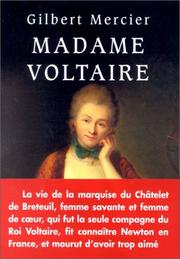| Listing 1 - 10 of 22 | << page >> |
Sort by
|
Book
ISBN: 9788822265463 Year: 2017 Volume: 479 Publisher: Firenze Casa Editrice Leo S. Olschki
Abstract | Keywords | Export | Availability | Bookmark
 Loading...
Loading...Choose an application
- Reference Manager
- EndNote
- RefWorks (Direct export to RefWorks)
“L’amore per lo studio è la passione più necessaria alla nostra felicità; è una risorsa sicura contro le disgrazie e una fonte inesauribile di gratificazione”: l’autoritratto di Émilie du Châtelet sta nella cornice di queste parole. Accanto a Voltaire inseguì il desiderio di capire il mondo e divenne la più celebre donna di scienza del secolo XVIII. Ma Émilie nutriva soprattutto l’ambizione di essere ricordata: è l’oblìo la morte peggiore.
Book
Year: 1747 Publisher: A Paris : chez Thiboust,
Abstract | Keywords | Export | Availability | Bookmark
 Loading...
Loading...Choose an application
- Reference Manager
- EndNote
- RefWorks (Direct export to RefWorks)
Book
Abstract | Keywords | Export | Availability | Bookmark
 Loading...
Loading...Choose an application
- Reference Manager
- EndNote
- RefWorks (Direct export to RefWorks)
Book
ISBN: 2259203574 Year: 2006 Publisher: Paris : Plon,
Abstract | Keywords | Export | Availability | Bookmark
 Loading...
Loading...Choose an application
- Reference Manager
- EndNote
- RefWorks (Direct export to RefWorks)
Authors, French --- Feminists --- Scientists --- Du Châtelet, Gabrielle Emilie Le Tonnelier de Breteuil,
Book
ISBN: 9782406087939 Year: 2019 Publisher: Paris : Classiques Garnier,
Abstract | Keywords | Export | Availability | Bookmark
 Loading...
Loading...Choose an application
- Reference Manager
- EndNote
- RefWorks (Direct export to RefWorks)
Philosophers --- Physicists --- Women philosophers --- Women physicists --- Du Châtelet, Gabrielle Emilie Le Tonnelier de Breteuil,
Book
Abstract | Keywords | Export | Availability | Bookmark
 Loading...
Loading...Choose an application
- Reference Manager
- EndNote
- RefWorks (Direct export to RefWorks)

ISBN: 2877064123 9782877064125 Year: 2001 Publisher: Paris: Éd. de Fallois,
Abstract | Keywords | Export | Availability | Bookmark
 Loading...
Loading...Choose an application
- Reference Manager
- EndNote
- RefWorks (Direct export to RefWorks)
Book
ISBN: 9782845590540 Year: 2008 Volume: 21 Publisher: Ferney-Voltaire Centre international d'études du XVIIIe siècle
Abstract | Keywords | Export | Availability | Bookmark
 Loading...
Loading...Choose an application
- Reference Manager
- EndNote
- RefWorks (Direct export to RefWorks)
Authors, French --- Scientists --- Feminists --- Ecrivains français --- Scientifiques --- Féministes --- Biography --- Biographies --- Biographie --- Du Châtelet, Gabrielle Emilie Le Tonnelier de Breteuil, --- Du Châtelet, Gabrielle-Emilie Le Tonnelier de Breteuil - [études diverses] --- Ecrivains français --- Féministes --- Du Châtelet, Gabrielle Emilie Le Tonnelier de Breteuil, --- Du Châtelet, Gabrielle-Emilie Le Tonnelier de Breteuil - [études diverses] --- Femmes scientifiques --- Du Châtelet, Gabrielle-Émilie Le Tonnelier de Breteuil,
Book
ISBN: 9781032094137 9781138351653 9780429435171 0429435177 9780429787195 0429787197 9780429787201 0429787200 9780429787188 0429787189 1138351652 Year: 2021 Publisher: New York ; London : Routledge,
Abstract | Keywords | Export | Availability | Bookmark
 Loading...
Loading...Choose an application
- Reference Manager
- EndNote
- RefWorks (Direct export to RefWorks)
The centerpiece of Émilie Du Châtelet's philosophy of science is her Foundations of Physics, first published in 1740. The Foundations contains epistemology, metaphysics, methodology, mechanics, and physics, including such pressing issues of the time as whether there are atoms, the appropriate roles of God and of hypotheses in scientific theorizing, how (if at all) bodies are capable of acting on one another, and whether gravity is an action-at-a-distance force. Du Châtelet sought to resolve these issues within a single philosophical framework that builds on her critique and appraisal of all the leading alternatives (Cartesian, Newtonian, Leibnizian, and so forth) of the period. The text is remarkable for being the first to attempt such a synthetic project, and even more so for the accessibility and clarity of the writing. This book argues that Du Châtelet put her finger on the central problems that lay at the intersection of physics and metaphysics at the time, and tackled them drawing on the most up-to-date resources available. It will be a useful source for students and scholars interested in the history and philosophy of science, and in the impact of women philosophers in the early modern period.
Women physicists --- Physicists --- Women mathematicians --- Mathematicians --- Physics --- Mathematics --- Physiciennes --- Physiciens --- Mathématiciennes --- Mathématiciens --- Mathématiciens. --- Physique. --- Du Châtelet, Gabrielle Emilie Le Tonnelier de Breteuil, --- Du Châtelet, Gabrielle-Émilie Le Tonnelier de Breteuil --- Du Châtelet, Gabrielle-Emilie Le Tonnelier de Breteuil --- Du Châtelet, Gabrielle Emilie Le Tonnelier de Breteuil, --- Physique --- Mathématiques --- 33.01 history of physics. --- Mathematicians. --- Mathematics. --- Physicists. --- Physics. --- Women mathematicians. --- Women physicists. --- Physik. --- Du Châtelet, Gabrielle Émilie Le Tonnelier de Breteuil, --- France. --- Mathématiciennes --- Mathématiciens --- Mathématiciens. --- Du Châtelet, Gabrielle-Émilie Le Tonnelier de Breteuil --- Du Châtelet, Gabrielle-Emilie Le Tonnelier de Breteuil
Book
ISBN: 3642324878 Year: 2013 Publisher: Berlin : Springer Spektrum,
Abstract | Keywords | Export | Availability | Bookmark
 Loading...
Loading...Choose an application
- Reference Manager
- EndNote
- RefWorks (Direct export to RefWorks)
Die französische Marquise Émilie du Châtelet war zu ihren Lebzeiten eine weit über die Grenzen Frankreichs bekannte Mathematikerin und Naturphilosophin. Dies ist erstaunlich, da ihr und ihren Geschlechtsgenossinnen in der Epoche der Aufklärung der Zugang zu den höheren Bildungsinstitutionen verwehrt war. Das vorliegende Werk beschäftigt sich mit der Frage, welche Bildungszugänge zum mathematischen und naturwissenschaftlichen Wissen für du Châtelet bedeutsam waren. Im Kontext der Bildungs- und Wissenschaftsgeschichte zeigt die Analyse ihrer Biographie eine bemerkenswerte Frau, die schon im elterlichen Haus Zugang zu den akademischen Elementen des Wissens und den höfischen Wissenschaften Fontenellscher Prägung bekam. Dank ihres unbedingten 'Willens zu Wissen' erschloss sie sich Mathematik, Physik und Naturphilosophie durch Anleitung, Lehrbücher, Lektüren und Korrespondenzen. Als Lehrbuchautorin öffnete sie zudem anderen einen Zugang zur damals modernen Physik.
| Listing 1 - 10 of 22 | << page >> |
Sort by
|

 Search
Search Feedback
Feedback About UniCat
About UniCat  Help
Help News
News